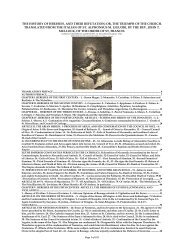The Writings of St. Francis of Assisi - + Saints' Works
The Writings of St. Francis of Assisi - + Saints' Works
The Writings of St. Francis of Assisi - + Saints' Works
Create successful ePaper yourself
Turn your PDF publications into a flip-book with our unique Google optimized e-Paper software.
THE WRITINGS OF ST. FRANCIS OF ASSISI<br />
Chapter XXI. On the inane and loquacious religious<br />
Blessed (is) the servant, who when he speaks, does not manifest all his own (thoughts) in<br />
view <strong>of</strong> (some) wage and is not swift to speak (cf. Prov. 29:20), but wisely provides, what he<br />
ought to speak and answer. · Woe to that religious, who does not retain in his heart (Lk 2:19.51)<br />
the good things, which the Lord shows him, and does not show them to others through work, but<br />
who in view <strong>of</strong> (some) wage desires rather to show them to men with words. · He himself<br />
receives "his wage" (cf. Mt 6:2; 6:16) and (his) hearers bring back little fruit.<br />
Chapter XXII. On correction<br />
Blessed (is) the servant who would endure discipline, accusation and rebuke as patiently<br />
from another as from his very self. · Blessed (is) the servant, who having been rebuked,<br />
acquiesces kindly, submits meekly, confesses humbly and makes satisfaction freely. · Blessed<br />
(is) the servant, who is not swift to excuse himself and humbly endures shame and rebuke<br />
because <strong>of</strong> a sin, where he has not committed (any) fault. 40<br />
Chapter XXIII. On humility<br />
Blessed (is) the servant, who is found to be as humble among his own subjects, as when<br />
for example he would be among his own lords. 41 · Blessed (is) the servant, who always remains<br />
continually under the rod <strong>of</strong> correction. 42 · A faithful and prudent servant is he (cf. Mt 24:45),<br />
who in all (circumstances) does not delay to punish his own <strong>of</strong>fenses interiorly by means <strong>of</strong><br />
contrition and exteriorly by means <strong>of</strong> confession and works <strong>of</strong> satisfaction.<br />
Chapter XXIV. On true love<br />
Blessed (is) the servant, who would love (dilectio) his own brother as much, when he is<br />
infirm to the point that he cannot repay him, as when he is a healthy (brother), who can repay<br />
him.<br />
Chapter XXV. Likewise on the same (subject)<br />
Blessed (is) the servant, who would so love and fear his own brother, when he is far from<br />
him, as when for example he is with him, and would not say anything behind him, which he<br />
cannot, with charity, say before him.<br />
Chapter XXVI. That the servants <strong>of</strong> God should honor clerics<br />
Blessed (is) the servant, who puts faith in the clerics who live rightly according to the<br />
manner <strong>of</strong> the Roman Church. · And woe to those who despise them; for though they may be<br />
sinners, no one however ought to judge them, since God Himself reserves to Himself alone their<br />
40 Since one always has many sins which have gone unpunished, it is only right that one should<br />
suffer for them, if even at another occasion.<br />
41 i.e. not just among one's immediate superiors, but among one's highest.<br />
42 i.e. in a state <strong>of</strong> mind and heart which welcomes correction from superiors and subjects.<br />
Page - 27













